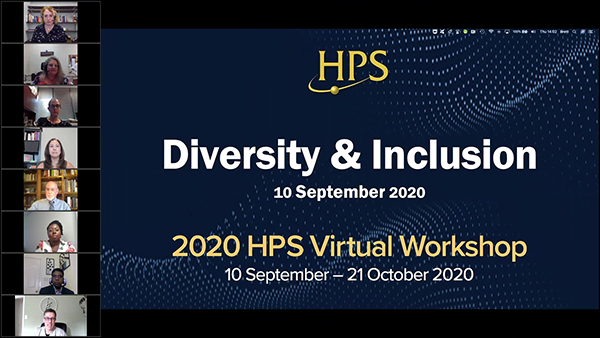News Archive
 On 10 September 2020, the Health Physics Society (HPS) Women in Radiation Protection Section and Membership Committee kicked off the 2020 HPS Virtual Workshop (the replacement programing for the 2020 HPS Annual Meeting) with the special session "Diversity and Inclusion." There were over 260 attendees and many actively participated throughout the session. We are very happy about the reach we achieved and the discussion we were able to motivate. A video of this first special session is available here.
On 10 September 2020, the Health Physics Society (HPS) Women in Radiation Protection Section and Membership Committee kicked off the 2020 HPS Virtual Workshop (the replacement programing for the 2020 HPS Annual Meeting) with the special session "Diversity and Inclusion." There were over 260 attendees and many actively participated throughout the session. We are very happy about the reach we achieved and the discussion we were able to motivate. A video of this first special session is available here.
"Diversity, Inclusion, and Equity" included three presentations that were supplemented by a panel discussion during the second half of the session. The presenters for the session were Kendall Berry, Sidni Moore, and Bae Chu. Berry introduced earlier and current Society initiatives to increase diversity, support inclusion, and further equity within the Society. These initiatives, including the Society's "Respectful Behavior Policy," are intended to broaden the range of radiation safety specialists who find a home in the Society. Moore presented a shocking historical account of segregation and exclusion in the field of health physics during the Manhattan Project and post-war eras and tried to answer the question of how these early experiences by African-American radiation safety specialists might still have an impact today. Chu quizzed the audience on their experience with diversity, inclusion, and equity in their respective workplaces. Even though the audience felt, for the most part, that they were immersed in diverse places of work, about half still witness discriminatory behavior or feel that to remain successful they have to guard themselves because of personal characteristics unrelated to their professional skills or capabilities.
For the panel discussion, the presenters were complemented by three others: Lisa Manglass, Jermiah Billa, and Michael Bellamy. Moderated by Nicole Martinez and Alex Brandl, the discussion centered on personal experience with harassment or difficulties and discomfort in the workplace or during professional functions due to personal traits. In the Society, as well as in many other STEM fields, the majority of professionals are Caucasian males, often aged between 40 and 60 years. Professionals who perceive themselves as different than that cohort frequently ask themselves, "Am I good enough?" Simply preparing for the workday requires additional consideration, concern, and caution.
The panelists recognized that we, as a Society and in the profession, have made significant progress already with respect to diversity, inclusion, and equity, but also feel that there is still room for growth. Understanding, exposure, and mentoring were uniformly viewed as the greatest opportunities and assets to motivate further diversity and retain professionals of diverse backgrounds and experiences in the Society and in the field of health physics. If we can self-reflect to try to identify our blind spots, and if we can actively work on being inclusive to all members of Society, regardless their sex, race, age, sexual orientation, or religious beliefs, we will be a welcoming and comfortable professional home for all.
Future workshops will be a series of virtual sessions that are hoped to aid member involvement and engagement since the traditional annual meeting earlier this summer had to be canceled due to the pandemic. More information on all workshops and PEP courses included in the 2020 HPS Virtual Workshop can be found on the workshop website.



